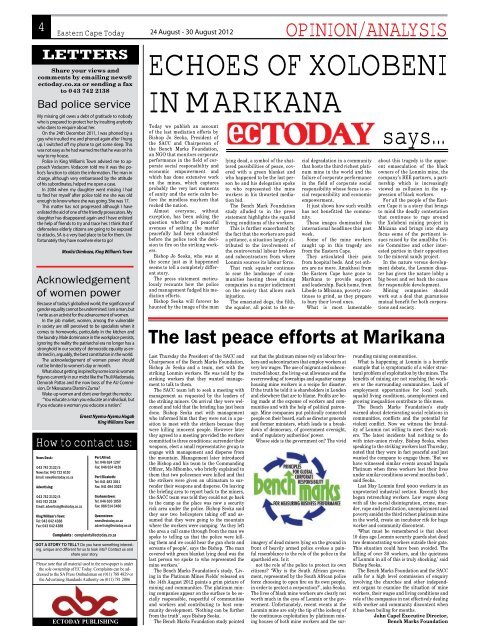Create successful ePaper yourself
Turn your PDF publications into a flip-book with our unique Google optimized e-Paper software.
124 OPINION/ANALYSIS<br />
Eastern Cape Today 24 August - 30 August 2012<br />
LETTERS<br />
Share your views and<br />
comments by emailing news@<br />
ectoday.co.za or sending a fax<br />
to 043 742 2138<br />
Bad police service<br />
My missing girl owes a debt of gratitude to nobody<br />
who is prepared to protect her by insulting anybody<br />
who dares to enquire about her.<br />
On the 24th December 2011, I was phoned by a<br />
guy who insulted me and phoned again after I hung<br />
up. I switched off my phone to get some sleep. This<br />
was not easy as he had warned me that he was on his<br />
way to my house.<br />
Police in King William’s Town advised me to approach<br />
Vodacom. Vodacom told me it was the police’s<br />
function to obtain the information. The man in<br />
charge, although very embarrassed by the attitude<br />
of his subordinates, helped me open a case.<br />
In 2004 when my daughter went missing I had<br />
to find her myself after police told me she was old<br />
enough to know where she was going. She was 17.<br />
This matter has not progressed although I have<br />
enlisted the aid of one of the friendly prosecutors. My<br />
daughter has disappeared again and I have enlisted<br />
the help of friends to try and trace her. I think that if<br />
defenseless elderly citizens are going to be exposed<br />
to attacks, SA is a very bad place to be for them. Unfortunately<br />
they have nowhere else to go!<br />
How to contact us:<br />
News Desk :<br />
043 742 2132/5<br />
News fax: 043 722 6110<br />
Email: news@ectoday.co.za<br />
Advertising:<br />
043 742 2132/5<br />
043 742 2138<br />
Email: advertising@ectoday.co.za<br />
King William’s Town:<br />
Tel: 043 642 4388<br />
Fax: 043 642 4388<br />
Mxolisi Dimbaza, King William’s Town<br />
Acknowledgement<br />
of women power<br />
Because of today’s globalised world, the significance of<br />
gender equality cannot be undermined. I am a man, but<br />
I write as an activist for the advancement of women.<br />
In the job market, women, among the vulnerable<br />
in society are still perceived to be specialists when it<br />
comes to homeworks, particularly in the kitchen and<br />
the laundry. Male dominance in the workplace persists,<br />
ignoring the reality the patriarchal era no longer has a<br />
stronghold in our society of democratic equality as enshrined<br />
in, arguably, the best constitution in the world.<br />
The acknowledgement of women power should<br />
not be limited to women’s day or month.<br />
What about getting inspired by some iconic women<br />
figures currently in our midst like the Thuli Madonsela,<br />
Denorah Pattas and the now boss of the AU Commision,<br />
Dr Nkosazana Dlamini Zuma?<br />
Wake-up women and dont ever forget the motto:<br />
“You educate a man you educate an individual, but<br />
if you educate a woman you educate a nation.”<br />
Ernest Nyemu-Nyemu Hogah<br />
King Williams Town<br />
Port Alfred:<br />
Tel: 046 624 1207<br />
Fax: 046 624 4139<br />
Port Elizabeth:<br />
Tel: 041 483 3011<br />
Fax: 041 484 3022<br />
Grahamstown:<br />
Tel: 046 636 1050<br />
Fax: 086 514 3480<br />
Queenstown:<br />
news@ectoday.co.za<br />
advertising@ectoday.co.za<br />
Complaints : complaints@ectoday.co.za<br />
Got a story to tell? Do you have something interesting,<br />
unique and different for us to look into? Contact us and<br />
share your story.<br />
Please note that all material used in the newspaper is under<br />
the sole ownership of EC Today. Complaints can be addressed<br />
to the SA Press Ombudsman on (011) 788 4829 or<br />
the Advertising Standards Authority on (011) 781 2006<br />
<strong>ECTODAY</strong> PUBLISHING<br />
ECHOES OF XOLOBENI<br />
IN MARIKANA<br />
Today we publish an account<br />
of the last mediation efforts by<br />
Bishop Jo Seoka, President of<br />
the SACC and Chairperson of<br />
the Bench Marks Foundation,<br />
an NGO that monitors corporate<br />
performance in the field of corporate<br />
social responsibility and<br />
economic empowerment and<br />
which has done extensive work<br />
on the mines, which captures<br />
probably the very last moments<br />
of sanity and the eerie calm before<br />
the mindless mayhem that<br />
rocked the nation.<br />
Almost everyone, without<br />
exception, has been asking the<br />
question whether all peaceful<br />
avenues of settling the matter<br />
peacefully had been exhausted<br />
before the police took the decision<br />
to fire on the striking workers.<br />
Bishop Jo Seoka, who was at<br />
the scene just as it happenned<br />
seems to tell a completely different<br />
story.<br />
The press statement meticulously<br />
recounts how the police<br />
and management fudged his mediation<br />
efforts.<br />
Bishop Seoka will forever be<br />
haunted by the image of the man<br />
says...<br />
The last peace efforts at Marikana<br />
Last Thursday the President of the SACC and<br />
Chairperson of the Bench Marks Foundation,<br />
Bishop Jo Seoka and a team, met with the<br />
striking Lonmin workers. He was told by the<br />
striking workers that they wanted management<br />
to talk to them.<br />
The SACC team left to seek a meeting with<br />
management as requested by the leaders of<br />
the striking miners. On arrival they were welcomed<br />
and told that the briefing has just been<br />
done. Bishop Seoka met with management<br />
who informed him that they were not in a position<br />
to meet with the strikers because they<br />
were killing innocent people. However later<br />
they agreed to a meeting provided the workers<br />
committed to three conditions: surrender their<br />
weapons, elect a small representative group to<br />
engage with management and disperse from<br />
the mountain. Management later introduced<br />
the Bishop and his team to the Commanding<br />
Officer, Ms Mbombo, who briefly explained to<br />
them that two policemen were killed and that<br />
the strikers were given an ultimatum to surrender<br />
their weapons and disperse. On leaving<br />
the briefing area to report back to the miners,<br />
the SACC team was told they could not go back<br />
to the camp as the place was now a security<br />
risk area under the police. Bishop Seoka said<br />
they saw two helicopters taking off and assumed<br />
that they were going to the mountain<br />
where the workers were camping. ‘As they left<br />
the area a call came through from the man we<br />
spoke to telling us that the police were killing<br />
them and we could hear the gun shots and<br />
screams of people’, says the Bishop. ‘The man<br />
covered with green blanket lying dead was the<br />
last person we spoke to who represented the<br />
mine workers.’<br />
The Bench Marks Foundation’s study, ‘Living<br />
in the Platinum Mines Fields’ released on<br />
the 14th August 2012 paints a grim picture of<br />
mining and communities. The platinum mining<br />
companies appear on the surface to be socially<br />
responsible, respectful of communities<br />
and workers and contributing to host community<br />
development. ‘Nothing can be further<br />
from the truth’, says Bishop Seoka.<br />
The Bench Marks Foundation study pointed<br />
lying dead, a symbol of the shattered<br />
possibilities of peace, covered<br />
with a green blanket and<br />
who happened to be the last person<br />
he and his delegation spoke<br />
to who represented the mine<br />
workers in his thwarted mediation<br />
bid.<br />
The Bench Mark Foundation<br />
study alluded to in the press<br />
statement highlights the squalid<br />
living conditions of the workers.<br />
This is further exacerbated by<br />
the fact that the workers are paid<br />
a pittance, a situation largely attributed<br />
to the involvement of<br />
the controversial labour brokers<br />
and subcontractors from where<br />
Lonmin sources its labour force.<br />
That rank squalor continues<br />
to scar the landscape of communities<br />
hosting these mining<br />
companies is a major indictment<br />
on the society that allows such<br />
injustice.<br />
The emaciated dogs, the filth,<br />
the squalor, all point to the so-<br />
cial degradation in a community<br />
that hosts the third richest platinum<br />
mine in the world and the<br />
failure of corporate performance<br />
in the field of corporate social<br />
responsibility whose focus is social<br />
responsibility and economic<br />
empowerment.<br />
It just shows how such wealth<br />
has not benefitted the community.<br />
These images dominated the<br />
international headlines this past<br />
week.<br />
Some of the mine workers<br />
caught up in this tragedy are<br />
from the Eastern Cape.<br />
They articulated their pain<br />
from hospital beds. And yet others<br />
are no more. Amakhosi from<br />
the Eastern Cape have gone to<br />
Marikana to provide support<br />
and leadership. Back home, from<br />
Libode to Mbizana, poverty continues<br />
to grind, as they prepare<br />
to bury their loved ones.<br />
What is most lamentable<br />
out that the platinum mines rely on labour brokers<br />
and subcontractors that employ workers at<br />
very low wages. The use of migrant and subcontracted<br />
labour, the living-out allowance and the<br />
overcrowding of townships and squatter camps<br />
housing mine workers is a recipe for disaster.<br />
If the truth be told it is shareholders in London<br />
and elsewhere that are to blame. Profits are being<br />
made at the expense of workers and communities<br />
and with the help of political patronage.<br />
Mine companies put politically connected<br />
people on their board, such as director generals<br />
and former ministers, which leads to a breakdown<br />
of democracy, of government oversight,<br />
and of regulatory authorities’ power.<br />
Whose side is the government on? The vivid<br />
imagery of dead miners lying on the ground in<br />
front of heavily armed police evokes a painful<br />
resemblance to the role of the police in the<br />
apartheid era. Is it<br />
not the role of the police to protect its own<br />
citizens? ‘Why is the South African government,<br />
represented by the South African police<br />
force choosing to open fire on its own people,<br />
in order to protect a corporation?’, asks Seoka.<br />
The lives of black mine workers are clearly not<br />
worth much in the eyes of Lonmin or the government.<br />
Unfortunately, recent events at the<br />
Lonmin mine are only the tip of the iceberg of<br />
the continuous exploitation by platinum mining<br />
houses of both mine workers and the sur-<br />
about this tragedy is the apparent<br />
emasculation of the black<br />
owners of the Lonmin mine, the<br />
company’s BEE partners, a partnership<br />
which is increasingly<br />
viewed as collusion in the oppression<br />
of black workers.<br />
For all the people of the Eastern<br />
Cape it is a story that brings<br />
to mind the deadly contestation<br />
that continues to rage around<br />
the Xolobeni mining project in<br />
Mbizana and brings into sharp<br />
focus some of the pertinent issues<br />
raised by the amaDiba Crisis<br />
Committee and other interested<br />
parties in their opposition<br />
to the mineral sands project.<br />
In the nature versus development<br />
debate, the Lonmin disaster<br />
has given the nature lobby a<br />
big boost and set back the cause<br />
for responsible development.<br />
Mining companies should<br />
work out a deal that guarantees<br />
mutual benefit for both corporations<br />
and society.<br />
rounding mining communities.<br />
What is happening at Lonmin is a horrific<br />
example that is symptomatic of a wider structural<br />
problem of exploitation by the mines. The<br />
benefits of mining are not reaching the workers<br />
or the surrounding communities. Lack of<br />
employment opportunities for local youth,<br />
squalid living conditions, unemployment and<br />
growing inequalities contribute to this mess.<br />
The Bench Marks Foundation’s study<br />
warned about deteriorating social relations in<br />
communities, conflicts and the potential for<br />
violent conflict. Now we witness the brutality<br />
of Lonmin not willing to meet their workers.<br />
The latest incidents had nothing to do<br />
with inter-union rivalry. Bishop Seoka, when<br />
speaking to the striking workers last Thursday,<br />
noted that they were in fact peaceful and just<br />
wanted the company to engage them. ‘But we<br />
have witnessed similar events around Impala<br />
Platinum when three workers lost their lives<br />
under similar conditions several months back’,<br />
said Seoka.<br />
Last May Lonmin fired 9000 workers in an<br />
unprotected industrial section. Recently they<br />
began retrenching workers. Low wages along<br />
with all the social disintegration, crime, murder,<br />
rape and prostitution, unemployment and<br />
poverty amidst the third richest platinum mine<br />
in the world, create an incubator rife for huge<br />
worker and community discontent.<br />
‘What must be remembered is that about<br />
10 days ago Lonmin security guards shot dead<br />
two demonstrating workers outside their gate.<br />
This situation could have been avoided. The<br />
killing of over 30 workers, and the quietness<br />
of Lonmin in all of this is truly shocking,’ said<br />
Bishop Seoka.<br />
The Bench Marks Foundation and the SACC<br />
calls for a high level commission of enquiry<br />
involving the churches and other independent<br />
organs to examine the situation of mine<br />
workers, their wages and living conditions and<br />
role of the companies in not effectively dealing<br />
with worker and community discontent when<br />
it has been boiling for months.<br />
John Capel Executive Director,<br />
Bench Marks Foundation




